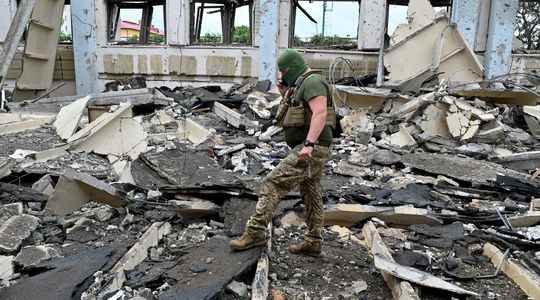Two days before the summit of NATO countries, which is being held from June 28 to 30 in Madrid, another major international meeting opened this Sunday in the Bavarian Alps, the G7. Meeting in Munich, Germany, the United States, Canada, France, Italy, Japan and the United Kingdom should agree to further increase the pressure on Russia, while Moscow gains land in the Donbass. The strategic city of Severodonetsk in the Lugansk region is now under Russian control, while Lysychansk in turn prepares for a full-scale assault.
- Russia reaps victories in eastern Ukraine
The city of Severodonetsk is “entirely occupied by the Russians”, acknowledged Saturday the mayor, Oleksandre Striouk, the day after the announcement by the Ukrainian army of its withdrawal from this city where around 100,000 inhabitants lived before the war. . The city is 90% destroyed, and the Azot factory, where hundreds of soldiers and civilians had taken refuge, is now under Russian control, according to the governor of the Lugansk region, who fears that the neighboring city of Lyssytchansk suffer the same fate.
Early this Sunday morning, the Russian army also launched missiles in the kyiv region in order, according to the mayor of the capital, to intimidate the Ukrainians in the run-up to the NATO summit organized from June 28 to 30 in Madrid. Four explosions hit a residential complex near the center of kyiv, causing a fire. Four injured, including a 7-year-old girl and her mother, were hospitalized, capital city mayor Vitaly Klitschko said on Telegram, adding that rescue work was continuing.
- The G7 starts this Sunday in Munich
The leaders of the G7 countries meet from this Sunday in Munich. Germany, the United States, Canada, France, Italy, Japan and the United Kingdom intend to agree to continue their support for Ukraine, where the Russian offensive is in its fifth month. Chancellor Olaf Scholz, host of the G7, recalled this week that support for Ukraine would require “perseverance” and that peace negotiations still seemed very distant. The Secretary General of NATO has, moreover, admitted that this conflict could last several years.
Ukrainian President Volodymyr Zelensky will be present by videoconference on Monday, taking advantage of this meeting of the powers to request the dispatch of new heavy weapons, while the bad news on the front is accumulating. A senior White House official said the summit would lead to “a set of concrete proposals to increase pressure on Russia and show our collective support for Ukraine.”
- Putin intends to deliver nuclear missiles to Belarus
Russian President Vladimir Putin has announced that his country will “in the coming months” deliver to Belarus, from where strikes have been carried out against Ukrainian territory, missiles capable of carrying nuclear charges. It is Iskander-M, said the Russian head of state at the start of a meeting with his Belarusian counterpart, Alexander Lukashenko, in Saint Petersburg. In statements, which risk further straining relations between Moscow and the West, the two leaders also said they wanted to modernize the aviation of Belarus to make it capable of transporting nuclear weapons.
kyiv accuses Russia of wanting to draw Minsk into the war and make Belarus a strategic outpost. This Saturday, twenty missiles were fired from Belarusian soil towards Ukraine, damaging the military center of Desna, in the north of the country.
- Several countries ban the import of Russian gold
The United Kingdom, the United States, Canada and Japan will ban imports of Russian gold, as part of new sanctions imposed on Russia, Downing Street announced this Sunday, on the first day of the G7 summit. “These measures will hit the Russian oligarchs directly and attack the heart of Putin’s war machine,” said Boris Johnson. “Putin is wasting his dwindling resources on this useless and barbaric war,” he added. Russia is a major gold-producing country whose exports to Britain accounted for nearly 15 billion euros in 2021.
